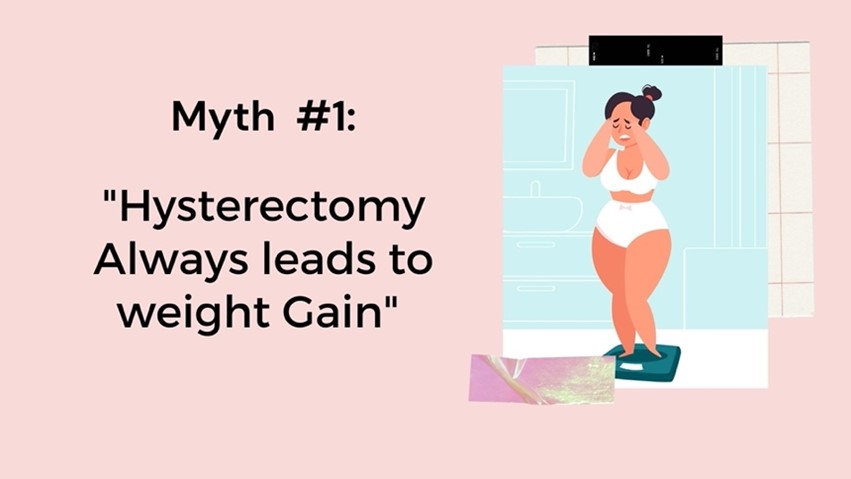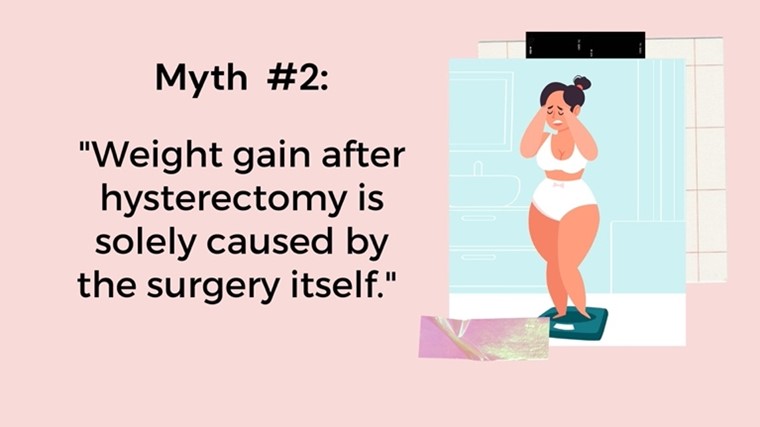
Hysterectomy is a surgical procedure involving the removal of a woman's uterus. It is commonly performed for various reasons, including treating gynecological conditions such as fibroids, adenomyosis, endometriosis, or uterine prolapse. While there are several factors to consider when discussing the effects of hysterectomy, one question that often arises is whether it can cause weight gain. In this article, we will delve into the topic and explore whether there is any association between hysterectomy and weight gain.

To gain insight into the potential effects of hysterectomy on weight, it's crucial to grasp the procedure's fundamentals. Hysterectomy can be performed using various techniques, such as abdominal, vaginal, or laparoscopic surgery, each with its own implications for recovery time. The surgical extent can also vary, ranging from solely removing the uterus to including the cervix, fallopian tubes, and ovaries in the procedure.
Surgical Method of Hysterectomy: The choice of surgical method for hysterectomy significantly affects recovery and, consequently, weight gain. Open abdominal hysterectomy typically requires more rest and has a slower recovery compared to laparoscopic, robotic, or vaginal hysterectomy. Opting for laparoscopic or robotic hysterectomy allows for a quicker recovery and minimizes the impact of surgery-related weight gain. Early resumption of daily activities has been found to have less influence on weight gain after surgery.
Hormonal Changes: Hormonal fluctuations, particularly if the ovaries are removed during the hysterectomy procedure, are a key factor associated with weight gain. When the ovaries are removed, it can induce surgical premature menopause, leading to a sudden decline in estrogen levels. Estrogen plays a crucial role in regulating metabolism. Additionally, menopause itself can contribute to weight gain due to hormonal changes, a slower metabolic rate, and a redistribution of body fat. However, in premenopausal women who retain their ovaries, there may be minimal hormonal variations as the ovaries continue to function normally after the surgery.
Lifestyle Changes: Hysterectomy often necessitates temporary lifestyle adjustments during the recovery period, including reduced physical activity and temporary dietary modifications. These changes can contribute to weight gain as the body adapts to the healing process. However, it's important to note that weight gain can also be influenced by other factors such as changes in appetite, stress, and individual lifestyle choices during the recovery period.
The common misconception that all women who undergo a hysterectomy will inevitably gain weight is simply untrue. While any surgery can potentially lead to temporary weight gain due to factors such as reduced activity, dietary changes, stress, and psychological impacts, weight gain is not a guaranteed outcome. Many women are able to maintain their pre-surgery weight, and individual experiences can vary significantly.

It's important to acknowledge that weight gain can occur for various reasons unrelated to hysterectomy. Factors such as natural aging processes, changes in activity levels, or alterations in dietary habits can contribute to weight fluctuations. Isolating the exact cause of weight gain can be complex, and it is crucial to consider a holistic view of an individual's overall health and lifestyle rather than attributing it solely to the surgery itself.

While weight gain may be a concern for some women post-hysterectomy, there are strategies to help manage weight effectively:
Balanced Diet: Focus on consuming a nutrient-rich diet that includes whole foods, fruits, vegetables, lean proteins, and healthy fats. Avoid excessive consumption of processed foods and added sugars keeping a count on the calories.
Regular Exercise: Engage in regular physical activity based on your doctor's recommendations. Incorporate a combination of cardiovascular exercises, strength training, and flexibility exercises to support overall health and weight management.
Hormone Replacement Therapy (HRT): If you experience menopause-like symptoms after a hysterectomy with ovary removal, your doctor may recommend hormone replacement therapy to help manage hormonal imbalances. This may alleviate symptoms such as weight gain, hot flashes, and mood changes.
While weight gain is a concern for some women after a hysterectomy, it's important to approach the topic with a balanced perspective. Hysterectomy itself does not automatically cause weight gain, but hormonal changes associated in case of ovary removal, lifestyle adjustments, and the onset of menopause can contribute to potential weight fluctuations. By maintaining a healthy lifestyle, focusing on balanced nutrition, staying physically active, and discussing concerns with healthcare professionals, women can effectively manage their weight post-hysterectomy or any surgery. Remember, each woman's experience is unique, so it's crucial to consult with your healthcare.
MBBS, MD(Obs&Gn),FMIS(Laparoscopy)
Head of the Department
Advanced Gynecological Laparoscopic Surgeon
& Pelvic Reconstructive Surgeon
MEDICLINIC WELCARE HOSPITAL
Al Garhoud, Dubai
MEDICLINIC PARKVIEW HOSPITAL
Umm Sequim, Al Barsha South 3, Dubai
Appointments 800-1999
www.mediclinic.ae
